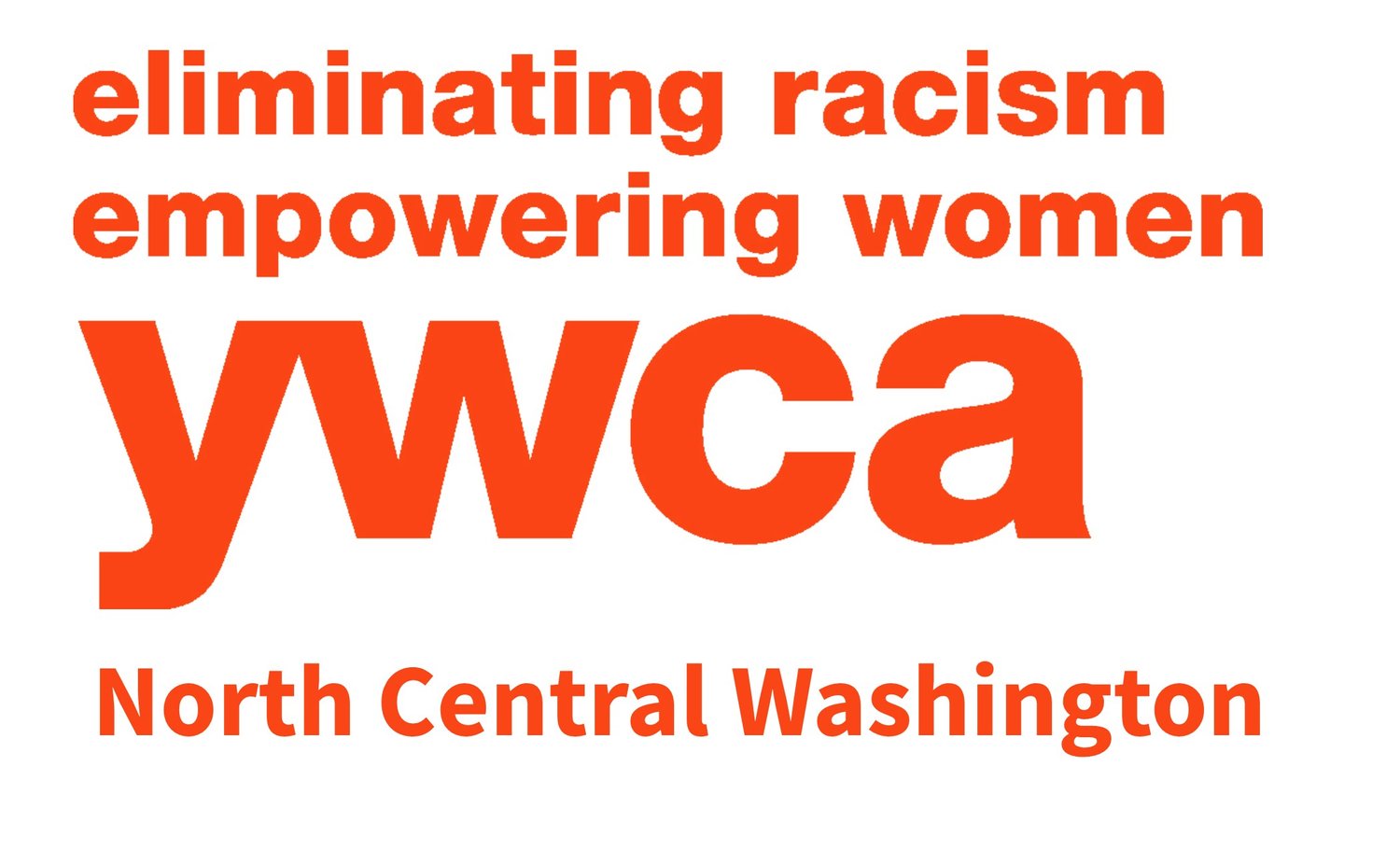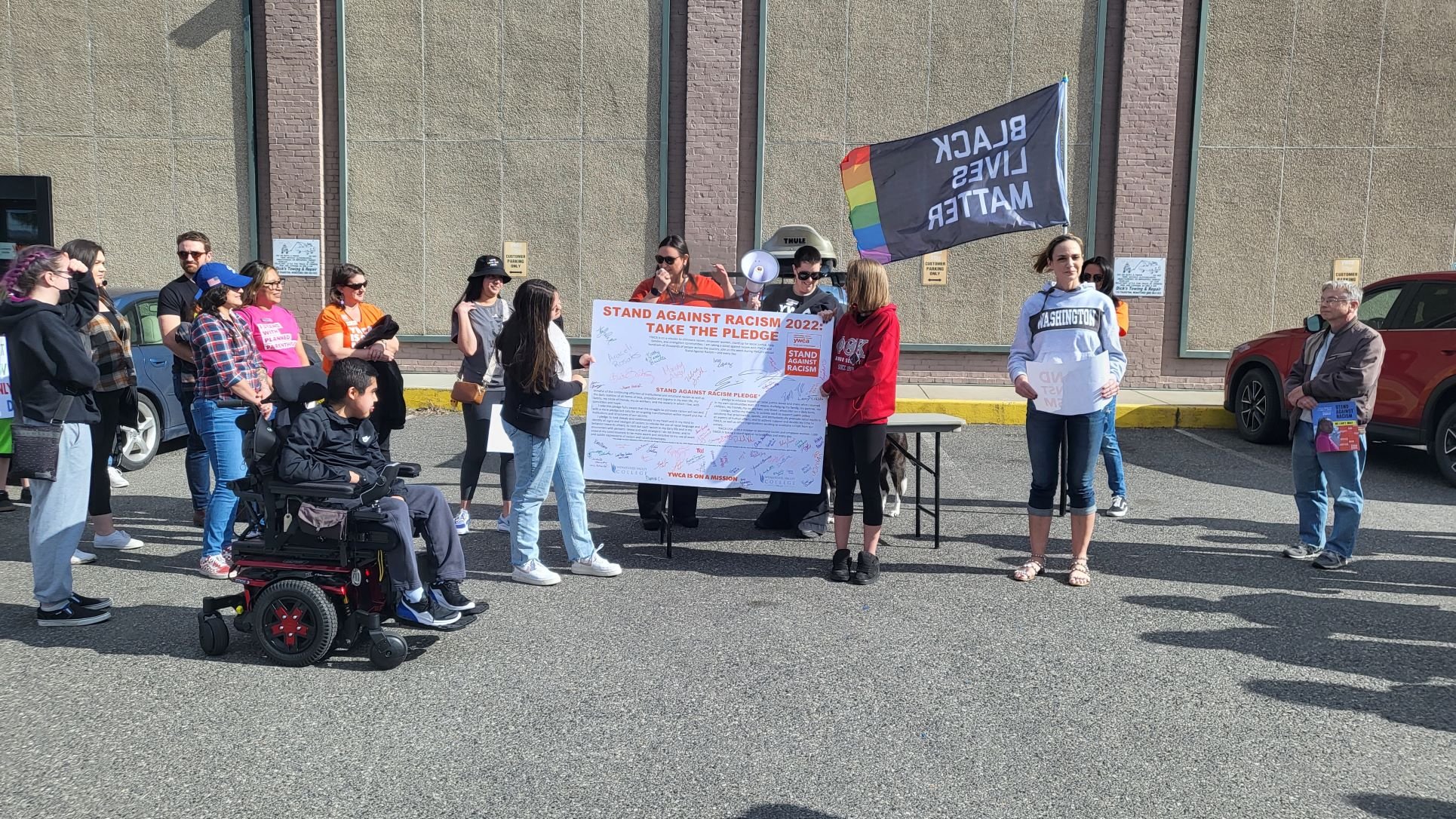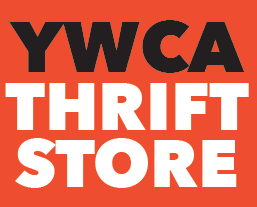YWCA is on a mission and YWCA NCW is making it our own!
To empower women and eliminate racism, we must meet our clients where they are most vulnerable and provide the compassion and services that place them on a path to self-sufficiency and prosperity.
Our vision is that all women and their families can achieve their full potential in a world without discrimination.
This requires a focus on the future, anticipating the needs of our clients, and creating innovative solutions to the problems they most often face – poverty, unsafe living conditions, lack of reliable and affordable childcare, and under- or unemployment.
We are evolving our services to meet the changing needs of our clients today and in the future.
We remain rooted in rich history, but our approach to serving our clients is holistic, strategic and innovative.
Nationally, YWCA advocacy issues include lobbying for pay equity and hate crimes legislation, increased funding for Head Start and passing the Violence Against Women Act. Locally, through our programs, we are changing lives and restoring hope for women, their families, and our community!
Homeless Housing ↘
Hundreds of individuals face homelessness in NCW. Each night dozens of men, women, and children go without shelter. We want to change that.
-

Emogene's Emergency Shelter
Our emergency shelter provides interim housing and family services for women and children.
-

New Bridges Transitional Shelter
Offers women and children a safe place to stay while putting them on a path to permanent housing.
-

Bridges Permanent Supportive Housing
Offers affordable rental units to people who have experienced homelessness.

In Crisis?
Homeless Housing Help Number:
509-662-3531 Option 2
Visit Our Location:
212 First St. Wenatchee, WA
Mon-Fri 11am-3pm
Thrift Store ↘
The YWCA Thrift Store features items generously donated by the community, with 100% of the proceeds directly supporting YWCA programs.
-

Shop
Shop quality gently used items such as furniture, housewares, electronics, and clothing.
-

Donate
All items have been generously donated by members of our community.
-

Volunteer
Volunteer with us at the Thrift Store to help maintain the flow of donations.
-

Clothing Assistance
We partner with 19 organizations to provide clothing to the communities most vulnerable.
-

Job Training
YWCA NCW offers both YWCA residents and community members a comprehensive job training program.
Case Management Services ↘
By helping community clients navigate different support systems, case management services empower community members to take control of their lives. YWCA NCW’s case management services for non-YWCA shelter clients include:
-

Confidential and non-judgmental support
YWCA NCW helps all people regardless of age, sex, race, religion, or disability.
-

Assistance with finding basic needs
YWCA NCW can help you where you’re at. Whether you need to enroll with public assistance to gain food benefits, apply for a housing list, or to get you food and clothing.
-

Referrals and help finding social/health services
YWCA NCW case management services can get you on track to making necessary medical and mental health appointments and/or supportive services.
-

General housing info and community referrals
YWCA NCW works with a network of housing providers. Case management services will support your journey in finding housing.
Relating to women and families is an essential component to the work that we do here at the YWCA. Our Economic Empowerment Program is dedicated to providing women and families with the financial information and tools they need in order to make informed financial decisions. Financial education, combined with support, resources and guidance can assist individuals in making those first steps towards an effective route out of poverty. The goal of the Economic Empowerment Program is to assist clients with taking charge of their financial situations.
Top Tips ↘
Economic Empowerment ↘
-
Tips to Women’s Economic Empowerment
By Aminka Belvitt, Digital Marketing Strategist & ForUsGirls Founder
1. BELIEVE IN YOURSELF
You have to believe in yourself more than you believe in anyone else. I once read a meme on Instagram that said, think of how much you love your bf, that is how much you need to believe in yourself and MORE!
2. HAVE DREAMS, BIG DREAMS
You need to dream, you need hope, you need to keep pushing while you can still push. I remember something an elder would always tell me in countering self-doubt, they would say, ”Make it happen”. As individuals, we find some excuse to say our dreams are not “realistic” and question our own reality. This elder would respond to me and say,
“If you don’t DREAM how will you know your limits, how will you know how high you can go, how will you know how far you can take your life to the MAX?”
It is scary to DREAM and DREAM BIG. Most times, we hold back from living in our full potential by hesitating, “the hesitation of living big”. We tend to look at others with the same personality, qualities, education and skills and wonder why things are happening from them and not happening for us. It is not until when we realise successful individuals dreamed and weren’t scared to stretch out their arms, put one foot in front of the other and soar, that we too can achieve the success we want in life! We can no longer shelter our visions and dreams. Let’s all unleashed our full selves into full throttle mode.
3. DON’T DATE SOMEONE WHO CANNOT BUILD AND BELIEVE WITH YOU.
So many times women waste time on boys and men whom they only want temporarily. If you are destined for great things, which I know you are, don’t waste your destiny allowing someone to take energy, time and space away from your vision!
It will deteriorate your focus. Even if it takes away .5% away that is .5% away from you accomplishing your goals and living in your full potential. Don’t allow it. Find someone with the same level of intensity or someone who can work with your level of intensity to support and uplift you.
Successful powerful couples work because they both are invested in one another’s vision and goals. Their relationship is designed and rooted in the other person accomplishing their goals because when one succeeds they both succeed.
And here is a shocker, REMAIN SOLO. Remaining solo and focusing on you, your plans and your happy place are the most valuable and expensive gift anyone/you can ever give you! Build yourself up.
Become a specialist on you!
Thrive so well that you won’t even notice you are without a romantic partner.
The beauty is, while you are working on building your dreams, projects, plans your ideal partner will intersect your path, as your energy will be so positive and contagious it will catch the right person. If not, then you create your own romantic opportunities with the right individual.
4. SUPPORT OTHERS. ESPECIALLY OTHER WOMEN AND MARGINALISED WOMEN
The same energy of being in a healthy and supportive relationship works the same for social circles and friends. Having a strong and supportive social cycle is referred to as social capita. Social Capita, allows you to flourish in life with people cheering you on. Their positive vibes provide fuel to your energy, ideas to your projects, collaboration when needed and continual cheering.
Supporting others around you, whether they are working on the same project as you or not. Helping others develops a better society and fosters further social capita.
Help marginalized groups who normally don’t receive mainstream support. Helping others forwards our society and seeing other people happy is a form of medicine that is free.
Marginalized women based on racial identity, sexual orientation binary and non-binary, language, class and ability all need supporters outside of their own marginalized circles. Such support of marginalized women provides an understanding of their life experiences and begins to reduce some of the marginalization they experience.
Partnership, friendship, and collaboration are all keys to success!
5. ALWAYS FIND TIME TO TAKE CARE OF YOU!
In chasing your dreams and or taking care of other people or building charitable initiatives, we can lose focus of caring for ourselves. We are no good to anyone when we are not physically, mentally, emotionally and spiritually healthy, and in some cases financially flexible and secure.
Pamper yourself in whichever works for you, i.e. candles, walks, spa treatment, new hair treatment or new hairstyle etc. new make-up, shopping, taking photos whatever amuse you, treat yourself!
Manage your expenses well by living within your means, shopping on sale, using coupons, borrow clothes and start a side business. Revenue, any extra revenue can be used to provide self-care and a peace of mind that you are financially secure.
Financial health can be a positive or a negative stress contributor. Create and manage a financially healthy plan to properly empower yourself in all areas of your life and in “taking care” of you.
You will be happier and more productive because of it.
It is wise and productive to curve out or schedule time, to check-in with yourself. Find out if you enjoy what you are doing, are you happy or unhappy, do you want to improve in some areas of your life or just to be Zen in silence. Whatever you do – ensure that you take care of you.
If you are going to be economically empowered, you are going to need to be fully aware, alert and healthy. Search for that extra cash flow to do whatever you want!
-
How to Conduct A More Effective Job Hunt
Whether you are looking for a summer job or full-time employment here are some tips on how to conduct a more effective job search, written by John Lees via www.theguardian.com:
1. Time things right
Many people rush at a job search and apply for roles they have little interest in or are unlikely to be shortlisted for. Not only will this pretty much guarantee rejection, it will dampen your confidence. Similarly, if you approach agencies with a poor sense of your target job, you are likely to be sidelined. The third biggest mistake is to use up all your best contacts too soon when you’re unclear how they can help. Slow down, take time to look at yourself and your confidence levels; consider how equipped you feel to summarize your strengths.
2. Take stock
Before you become a one-person marketing machine, think about what you’re selling. Do you know what you’re looking for? What job titles are relevant to you? Can you list your main skills? Do you have evidence of achievements? Which employers appeal to you and why? Don’t go near busy decision-makers until you have answers to all these questions.
3. Plan for rejection
Even in a buoyant market, rejection is common; in today’s economy you will hear no a lot more than you hear yes. To maintain your confidence and avoid becoming a job beggar desperate to take anything, cultivate resilience.
But don’t squander it by applying for jobs far outside your skills range where you’re unlikely to get any kind of response. Recruit two or three supporters who you can meet regularly to remind you what you’re good at, broaden your thinking and help pick you up when you receive inevitable knock-backs.
4. Gather evidence
Before you begin drafting a CV or stumble into interviews, list raw material from your past – without editing. Draw up a long, unfiltered list of what you’ve done. Go over every part of your experience which looks like work, including part-time, temporary, unpaid posts and work placements. List every skill you learned and practised, sectors where you have work experience and anything that looks like an achievement (see below). Then look at volunteering, your studies and activities outside work. Try to gather several pages of material before deciding on the primary message for the lead part of your CV.
5. Decide on your three main messages
Anyone who recommends you is likely to pass on only three or four items of information about you – your experience, ability and personality. You have more control over this process than you think.
Scrutinizes the first few sentences of your CV. Make sure they are positive, memorable and clearly outline what you want to achieve. How likely is it that someone will repeat this information? Do you make clear what you have to offer and the kind of role you’d like to fill? Emphasize these messages in your CV, social media profile and what you say when networking.
6. Research before you job search
It’s no use trying to impress employers if you have very little sense of what will press their buttons. Do your homework thoroughly before making any kind of approach – at least two hours of research. If you’re called to interview, make your research even more thorough. Don’t just repeat information from the organization’s website – try to speak to people who know what the organization is trying to achieve and the kind of people they’re currently looking for. If you’re trying to make a career change, seek out people who have made the leap before you, learn the shortcuts and avoid the bear traps.
7. Market test your CV
Don’t be under the illusion that you should send out your CV widely in the early stages of your job search. It’s far better to talk to people about your career ideas and gather information than to send out a poorly drafted document, which will close more doors than it opens. You may be secretly pleased with your CV but it’s vital to show it to someone with hiring experience. Ask for a summary rather than an opinion. For example, don’t ask “What do you think of my CV?”, ask “What does my CV tell you about what I can do next?” If the answer is brief and makes sense, your CV is probably working.
8. Get interview feedback outside the process
Many jobseekers waste real job interviews as practice sessions. Interviews are hard enough to get; don’t waste them by making basic errors. Find someone who has interviewing experience who will give you honest feedback on first impressions, how you link your experience to the job on offer and how well you handle tricky questions. Practice short, upbeat answers to tricky questions about gaps in your CV or why you’re job seeking right now. Don’t ignore vital job-related topics or the dull but obvious questions, such as ‘tell us about your strengths and weaknesses’.
9. List and research target organizations
People will need examples of the kind of organizations you’re interested in to help you. This matters even more if you’re trying to make a career change; you’ll be a much more credible candidate if you’ve researched the sector in-depth and can say something about the main players.
It’s also smart to identify employers in your locality. Build up a list of six or so target organizations and spend time every week learning more about them, trying to get closer to them through mutual connections, exploring job boards and generally doing everything you can to pitch yourself as a potential employee.
10. Use a multi-channel approach
Make direct approaches to organizations who are not currently advertising, build relationships with the right recruitment agencies, talk to people in interesting roles and sectors, and research like mad. Above all else, don’t kid yourself that spending all day in front of a computer screen is the best use of your time; get in front of people too. At least once a week put on smart clothes, find someone to meet so you can practise talking about yourself and what you’re looking for. It maintains your confidence levels and ensures you’re remembered.
-
Smash Every Glass Ceiling: Reflections on USOW
By Sarah Wolf-Knight, YWCA Dayton Grants & Advocacy Manager
I was lucky enough to be chosen as a delegate to the 2018 United State of Women Summit (USOW) with support from YWCA USA. As I sat through the speaking presentations at USOW, I was struck by the level of representation achieved in the room. Truly, any little girl could look up at the stage and recognize some version of herself. The first day’s program highlighted the contributions of Ibtihaj Muhammad, the first Muslim American woman to wear a hijab while competing for the US in the Olympics, Andrea Jenkins, the first openly transgender black woman elected to public office in the U.S., Ilhan Omar, the first Somali-American lawmaker in the country, as well as many other women with diversity of culture, race, class, and sexual orientation.
Representation for young girls is so important. It shows them that they can be anything they can dream. A study done in India in 2012 found that girls growing up in villages with no female political leadership were 32% less likely to dream of continuing their education past primary school than their counterparts who grew up with strong female leaders [i]If our girls only see men, or white people, or cisgender people as leaders, then they might not be able to envision a world where they themselves run it all. The notorious Ruth Bader Ginsberg inspired my young self to believe that I, too, could be a force for change and mold the world I want to live in. I could see myself in her; a Jewish girl with brown hair and green eyes impassioned about the injustice I saw in the world. Now, it is up to us to be examples of everything that a girl can be.
One of my favorite USOW quotes from my forever first lady, Michelle Obama, reads: “I think if we want our daughters to dream bigger than we did we have more work to do. So many of us have gotten ourselves to the table, but we’re still too grateful to be at the table. Holding onto our seats isn’t enough to help our girls. We have to shake things up.” Those women on the stage didn’t become aspirational role models without breaking down barriers. Every time there is a “first” to do something, it also implies that person will not be the last. It takes a strong woman willing to smash every glass ceiling and break down every barrier in her path to show young girls that they can be anything.
First ladies and career idols are not the only ones who act as positive role models. Peer representation is really important. Girls who see other girls that are interested and successful in the things that they are interested in are more likely to envision themselves achieving success. My favorite part of the USOW program was the inclusion of our nation’s future change makers right next to its current ones. Yara Shahidi sat equally on a panel with Sen. Kamala Harris. Marley Dias and Marsai Martin had the honor of introducing Michelle Obama and Tracee Ellis Ross. Journey Jamison, Mei-Ling Ho-Shing and Tyah-Amoy Roberts earned a platform to talk about their work combatting gun violence. USOW demonstrated that young people have an important perspective and gave these inspiring young women of color an opportunity to make their voices heard. By putting these impactful voices on the stage, USOW inspired other young girls of color to follow Michelle Obama’s wise words and practice everyday who they want to be.
As YWCA Dayton works to reimagine our Girls LEAD! program and explore new opportunities for women’s leadership, we will work to ensure representation at all levels of our community and to elevate the voices of young women and girls, so that all girls, no matter their race, class, religion or sexual orientation, believe that they can be anything.
-
How Women Entrepreneurs Can Be More Successful
By Kerry Hannon, www.forbes.com
The biggest stumbling block to starting a new business — and succeeding —for anyone, is money. For women, the challenge is multiplied.
There are plenty of reasons why women are left out in the cold, ranging from the lack of access to investors to not being taken seriously. Yes, even in this day and age, “access to capital is one of the most significant hurdles for women starting and growing their businesses,” says Carla Harris, chair of the National Women’s Business Council (NWBC), a 30-year-old, nonpartisan federal group that serves as an independent source of advice and counsel to the President, Congress and the U.S. Small Business Administration on economic issues of importance to women business owners.
I just interviewed Harris, who was appointed by President Barack Obama to chair the NWBC in 2013, for her insights about women entrepreneurs and her advice for women who have launched businesses or hope to soon.
“NWBC research has shown that men tend to start their businesses with nearly twice as much financial capital than women ($135,000 versus $75,000),” Harris, who is also a vice chairman, managing director and senior client adviser at Morgan Stanley. told me. “Access to markets is an integral component of business success.”
Some more discouraging news, from Harris: “The federal government has a statutory goal of awarding 5% of eligible prime contracting dollars to women-owned small businesses. Since the establishment of this goal in 1994, it wasn’t until two years ago that it first met its goal and missed it in 2016.”
Harris is waiting to see the report card for 2017. “It’s a significant indicator of progress for women business owners, if met,” she says.
Seriously. Given that the growth of women business enterprises over the last 10 years is unprecedented, I’m reminded of the old image that Ginger Rogers evoked of women dancing backwards in heels.
In its recently published Accelerating the Future of Women Entrepreneurs: The National Women’s Business Council 2017Annual Report, the NWBC notes that, according to the U.S. Census Bureau, between 2002 and 2012, the number of women-owned firms increased at a rate 2 ½ times the national average (52% vs. 20%) and employment in women-owned firms grew at an impressive rate: 4 ½ times that of all firms (18% vs. just 4%). Women are starting more than 1,140 businesses a day, says Harris’ group.
As of 2012, there were 3.2 million women entrepreneurs over 55. From 2007 to 2012, Harris says, women entrepreneurs over 65 saw the highest growth of the number of firms in any age group for men or women — up 42%.
And American Express’ 2017 State of Women-Owned Businesses Report, estimates that from 1997 to 2017 the number of women-owned firms also increased by a rate of roughly more than 2 ½ times the national average (114% vs. 44%).
With that big picture in mind, here’s more from Harris:
Next Avenue: What can women entrepreneurs do to be more successful?
Carla Harris: Women entrepreneurs should leverage the resources already in place, as there are a plethora of supports across the country specific to women business owners. In a thriving ecosystem, there are in-person and virtual incubators and accelerators, SBA resource partners such as SCORE, Women Business Centers and Small Business Development Centers, as well as online educational resources that provide powerful knowledge throughout the business lifecycle.
Also, leveraging human capital and your already established network is essential and could include finding a mentor that is right for you and your stage of business.
Create a plan to access the capital — one that looks at traditional ways of financing, but also look at additional strategies for accessing capital such as crowdfunding, community development financial institutions, microloan programs and the network of angel investors that are specifically focused on women.
What is going on at the Small Business Administration — or not going on there — regarding women business owners and small business owners in general?
At NWBC, we are committed to working more closely with the U.S. Small Business Administration, the Congress, and the White House to promote and construct policies that will address access to capital and market inequities that women business owners still face. We strongly believe that if we can address these two particular challenges, then women business owners will have the most important tools that they need to successfully scale their businesses and to accelerate their impressive rate of job creation.
In our Annual Report, we recognized the critical policy actions the administration took in science, technology, engineering, and mathematics (STEM), cybersecurity, and disaster relief and recovery during the past year. Based off our research, various engagements within the entrepreneurial ecosystem and conversations with our key stakeholders, we developed in the report eleven actionable recommendations that are a priority for all stakeholders in order to accelerate policy change to support women entrepreneurs.
How is necessity a driver of entrepreneurship?
Many women become entrepreneurs out of necessity. While the traditional definitions largely focus on the concept of survival entrepreneurship or emergency entrepreneurship, NWBC research shows that there are broader implications than just starting a business to meet basic and immediate economic needs for survival.
For example, there may not be available employment options for women to achieve their desired career or financial outcomes or there may be overly restrictive or outright absent workplace policies that do not acknowledge or accommodate the caregiving roles that women, in particular, play in modern society.
All these factors contribute to a women’s necessity to become an entrepreneur rather than seek traditional means of employment.
Because research highlights that enthusiastic or opportunistic entrepreneurs are more likely to succeed than reluctant entrepreneurs, more likely to create jobs, and more likely to meaningfully contribute to the economy, it is in the country’s best interest to pave the way for their success.
What are some of the gender-specific motivations, and how has that changed in recent years for women?
There are a number of societal deterrents particular to women that can be critical motivators for women starting their businesses: including discrimination, child care challenges, pay inequities and restrictive workplace policies.
Restrictive workplace polices often center around situations such as maternal leave or sick leave, when balancing caretaking responsibilities. There have been some changes including state, family and medical leave, but these are not nationwide.
For broader change and a marked improvement in women’s professional advancement away from entrepreneurship, more advanced policy directives should be explored that can alleviate such flexibility challenges, so no woman has to choose between employment and caring for a child or elderly parent.
What are the key resources to help women start and run a business today?
Women entrepreneurs identified SBA’s Women’s Business Centers, incubators, mentors, professional networks and even friends and family as key resources to help with starting and running a business.
Other examples of resources that are included in the Council’s online, searchable repository, Grow Her Business: A Resource from Start-up to Scale-up, are: venture capital opportunities, membership associations, mentorship opportunities, conferences, competitions and accelerator and incubator programs.
What contributes to the success of older women entrepreneurs?
From our various conversations with women entrepreneurs around the country, we have learned that many women enter entrepreneurship after retirement or as a second career.
Women entrepreneurs 50-plus have unique perspectives, connections and relationships they have cultivated throughout their careers that they can leverage for the success of their businesses. They are also more likely to have their own capital as well as a network of potential capital they can access for their businesses. Our studies show that emerging companies that start with a strong foundation of capital are far more likely to be successful than those who are poorly capitalized.
-
Advocacy & Outreach ↘
We’ve been at the forefront of the biggest issues of the day for 160 years: from voting rights to civil rights, from affordable housing to pay equity and from violence prevention to health care reform. We carry on this long tradition of social action and advocacy to advance our mission — and you are a crucial part of this work. Your voice is critical as we advocate for policies that bring us closer to eliminating racism, empowering women, and ensuring peace, justice, freedom and dignity for all.
-

HallowQueens
YWCA NCW’s annual fundraiser event.
-

Women's Empowerment Center
Located in the YWCA NCW main building, the Women’s Empowerment Center is a place to host advocacy and community events.
-

Until Justice Just Is
A national initiative for a more just and inclusive world.
-

Juneteenth
A celebration of black liberation and the abolishment of slavery in the United States.
-

Anti-Racism and Equity Training
Trainings and education on the topics of LGBTQ Issues, Power and Privilege, Homelessness, and/or Being an Ally.
-

EFSP
YWCA NCW facilitates the Emergency Food and Shelter Program in Chelan and Douglas Counties. The program supplements and expands ongoing work of local nonprofit and governmental social service organizations to provide shelter, food and supportive services to individuals and families who are experiencing, or at risk of experiencing, hunger and/or homelessness.



